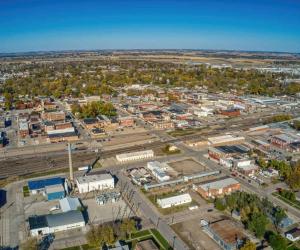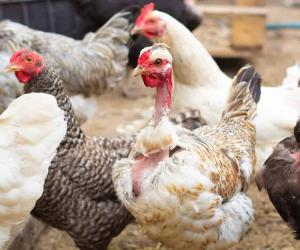6 Common Newfoundland Health Problems
Newfoundlands look like a giant bear of a dog. But they’re truly teddy bears at heart. Newfies, as they’re often called, are typically sweet-tempered, calm, and friendly. They’re known for their gentleness towards children, earning them a reputation as a “nanny dog”. But there are some common Newfoundland health problems.
History
Newfoundlands have a history as working dogs, helping Canadian fishermen haul and cart the day’s catch. The dogs also have webbed feet that make them natural swimmers. Their lung capacity and large size enable them to swim far to perform water rescues. Male Newfoundlands can weigh around 150 lbs, while females may be around 120 lbs. They’re one of the largest breeds, but also one of the most kind and patient breeds. These are some health concerns to be aware of.
1. Newfie Neck

If your dog’s neck bothers them, it could be Newfie Neck.
©Pandas/Shutterstock.com
This term describes anything from a pinched nerve, slipped disk, or arthritis causing pain to a Newfoundland’s neck. It happens because of the breed’s huge head, so it’s important to make sure there isn’t too much pressure applied around the neck from activities or pulling on a collar.
2. Wobbler’s Syndrome

Wobbler’s Syndrome is usually genetic, while Newfie Neck may happen due to activities.
©rzoze19/Shutterstock.com
This malformation of the vertebrae within the neck can lead to pressure on the spinal cord. Eventually, the dog will look “wobbly”. They may show a lack of coordination, weakness, and in a worst-case scenario, paralysis. The condition is typically genetic in some larger breeds like Newfoundlands. Treatment involves pain medication and anti-inflammatories, as well as limiting exercise.
3. Dilated Cardiomyopathy

Some Newfoundlands might develop heart conditions.
©Dixi_/ via Getty Images
It’s estimated that 10 percent of Newfoundlands develop Dilated Cardiomyopathy. This disease of the heart muscle makes the heart become thin-walled and dilated. Symptoms include loss of heart function and abnormal heart rhythm. Eventually, there will be heart failure. It can take years for a dog to show symptoms before they suddenly are ill. The best way to prevent it is to make sure dogs with the condition are not bred, as there is a genetic component.
4. Gastric Dilatation-Volvulus

Newfoundlands are prone to bloat due to their size.
©iStock.com/rzoze19
This severe type of bloat happens when the stomach fills up with food or gas and then rotates. It reduces blood supply to the spleen and stomach. It’s most common in deep-chested dogs like the Newfoundland. Bloat risk also increases as a dog gets older, or if the dog eats from elevated bowls.
5. Osteosarcoma

Newfoundlands are one of the large breed dogs that are prone to bone cancer.
©Eric Isselee/Shutterstock.com
Newfoundlands are susceptible to this type of bone tumor that can be common in large dog breeds. Initial symptoms may include limping or lameness. If the tumor is detected early, it can be removed and a dog can live a long, happy life.
6. Hip and Elbow Dysplasia

Feed and exercise large, growing puppies carefully to avoid dysplasia.
©JStaley401/ via Getty Images
Common in large dog breeds like Newfoundlands, the ball and socket do not fit or develop properly with hip dysplasia. They rub and grind, leading to deterioration of the joint.
Elbow dysplasia is an irregular development of the elbow joint. The three bones in the elbow don’t fit together perfectly as a young, large dog grows. The dog’s front legs may rotate inward with elbows rotating outward.
Both conditions can lead to pain, arthritis, and limping. Treatment involves the use of joint supplements, pain relievers, or modified exercise. Surgery may also be recommended.
The Most Common Newfoundland Health Problems & Concerns
| 1. | Newfie Neck |
| 2. | Wobbler’s Syndrome |
| 3. | Dilated Cardiomyopathy |
| 4. | Gastric Dilatation-Volvulus |
| 5. | Osteosarcoma |
| 6. | Hip and Elbow Dysplasia |
The photo featured at the top of this post is © iStock.com/Dixi_









